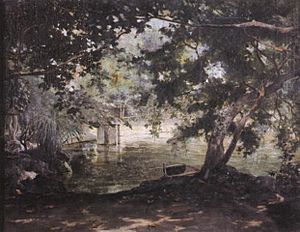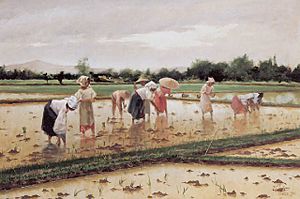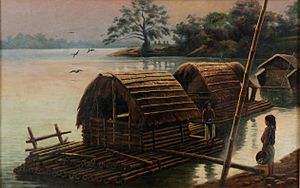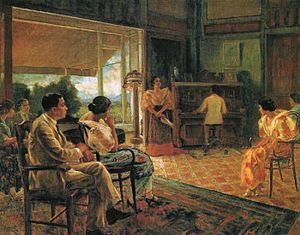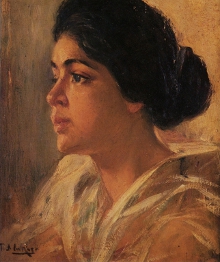Fabián de la Rosa facts for kids
Quick facts for kids
Fabián de la Rosa
|
|
|---|---|
| Born |
Fabián de la Rosa y Cueto
May 5, 1869 |
| Died | December 14, 1937 (aged 68) Quiapo, Manila, Philippine Commonwealth
|
| Nationality | Filipino |
| Known for | Painting |
|
Notable work
|
Women Working in a Rice Field (1902) Transplanting Rice (1904) The Death of General Lawton (1904) |
| Movement | Realism |
Fabián de la Rosa y Cueto (born May 5, 1869 – died December 14, 1937) was a famous Filipino painter. He was the uncle and teacher of Fernando Amorsolo, who later became a national artist in painting. Fabián de la Rosa is known as a "master of genre" art. This means he was excellent at painting scenes from everyday life.
Contents
Early Life and Learning About Art
Fabián de la Rosa was born in Paco, Manila. His parents were Marcos de la Rosa and Gorgonia Cueto. Fabián grew up in a family of artists. He started drawing at a very young age, even before he could write!
His aunt, Marciana de la Rosa, taught him how to draw portraits and landscapes when he was just ten. He also learned from his uncle, Simón Flores y de la Rosa. Simón was a well-known painter of portraits and church interiors. Fabián lived most of his life in the Philippines. He visited Europe for the first time when he was 39 years old. He married Gorgonia Tolentino on January 13, 1900.
Becoming a Professional Artist
Art School Training
Fabián de la Rosa began his formal art education at age 12. He joined the Escuela de Artes y Oficios in 1881. After three years, his father passed away. This meant Fabián had to leave school to help his family. During this time, he painted his first known masterpiece, La Perla de Lucban.
In 1893, at 24, he entered the Escuela Superior de Pintura Escultura y Grabado. Here, he learned from Lorenzo Guerrero and Miguel Zaragoza. In 1898, Fabián won a scholarship to the Real Academia de Bellas Artes de San Fernando in Madrid, Spain. But the Philippine Revolution started, so he could not go.
Later, under American rule, the Escuela became part of the University of the Philippines (established in 1908). It was renamed the UP School of Fine Arts. In 1908, he traveled to Europe. He got a scholarship from the Germinal Cigar Factory. He studied at the Académie Julian in Paris, France.
Teaching Art
After his trip to Europe, Fabián de la Rosa became one of the first teachers at the School of Fine Arts. This school was part of the University of the Philippines. He taught his students a detailed style of painting. De la Rosa became the full director of the school from 1927 to 1937.
Art Exhibitions
In 1928, Fabián de la Rosa and his wife went back to Europe. He painted in Paris for four months. He also visited Munich, Germany, Geneva, Switzerland, and Rome. When he reached Madrid, Spain, he held an exhibit of his paintings at the Ateneo de Madrid.
Experts believe that de la Rosa painted about 1,000 works in his lifetime.
Famous Artworks
- Women Working in a Rice Field, 1921
- Transplanting Rice, 1904
- The Death of General Lawton, 1904
- Un recuerdo de la Villa Borghese (A Remembrance of the Villa Borghese), 1909
- Planting Rice, 1921
- Los Baños, watercolor, 1922
- La pintora (Woman Painter)
- La bordadora (The Embroiderer)
- Landscape with Dark Trees, 1927
- Barcazas en el Rio (Houseboats in a River)
- Pasay Beach, Manila, 1927
- Young Filipina, 1928
- El kundiman (The Kundiman), 1930
- Riverview of Sta. Ana, 1938
- Marikina Road, around 1939
- View of Santa Ana
- Marikina Valley
- El Kabayo, 1938
Awards and Recognition
Fabián de la Rosa received awards even after his death. The City of Manila gave him the Patnubay ng Sining at Kalinangan (Guide of the Arts and Culture) award in 1968.
His painting Transplanting Rice won a gold award. This was at the International Exposition in St. Louis, Missouri in 1904. At the same exposition, his painting The Death of General Lawton won a bronze prize.
An exhibition of de la Rosa's paintings was held on January 14, 2007. It took place at the Jorge B. Vargas Museum of the University of the Philippines in Diliman, Quezon City. The show was called "Fabian De la Rosa (1869-1938) Retrospective Exhibition."
See also
 In Spanish: Fabián de la Rosa para niños
In Spanish: Fabián de la Rosa para niños
- Justiniano Asuncion
- José Honorato Lozano
- Damián Domingo
- Fernando Amorsolo
- Juan Luna
- Félix Resurrección Hidalgo
 | Frances Mary Albrier |
 | Whitney Young |
 | Muhammad Ali |


